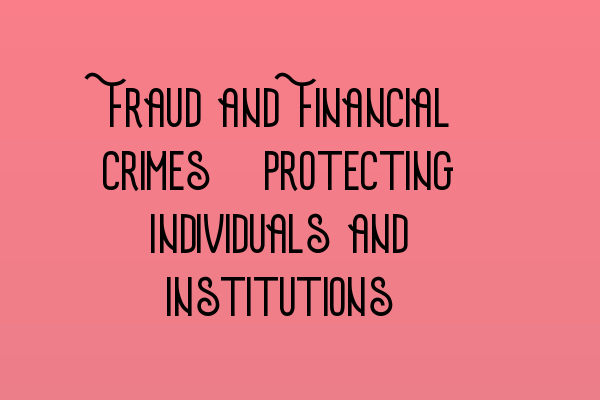Fraud and Financial Crimes: Protecting Individuals and Institutions
Financial crimes, including fraud, money laundering, and embezzlement, pose significant threats to individuals and institutions alike. In an increasingly interconnected world, where digital transactions have become the norm, protecting oneself from such crimes has become essential. In this article, we will explore the different types of fraud and financial crimes that exist, their impact on society, and the measures individuals and institutions can take to safeguard themselves.
Types of Financial Crimes
Financial crimes encompass a wide range of illegal activities aimed at unlawfully acquiring wealth or assets. Some of the most common types of financial crimes include:
- Identity Theft: This occurs when someone steals another person’s personal information, such as their Social Security number or bank account details, to commit fraud.
- Credit Card Fraud: This involves unauthorized use of another individual’s credit card information to make fraudulent purchases.
- Money Laundering: This refers to the process of making illegally obtained money appear legitimate by channeling it through legitimate financial institutions or businesses.
- Tax Evasion: This involves intentionally avoiding paying taxes by falsifying income or claiming unauthorized deductions.
- Insider Trading: This occurs when individuals trade stocks or securities based on non-public information.
Impact on Society
Fraud and financial crimes have detrimental effects on both individuals and society as a whole. They erode trust in financial systems, undermine economic stability, and can lead to significant financial losses for victims. Additionally, financial crimes can fund other illegal activities, such as terrorism and drug trafficking, further exacerbating societal issues.
Protecting Individuals
Individuals can take several steps to protect themselves from falling victim to financial crimes:
- Be cautious with personal information: Avoid sharing sensitive information, such as Social Security numbers or bank account details, with untrusted sources.
- Monitor financial accounts regularly: Keep a close eye on bank statements, credit card bills, and credit reports to detect any fraudulent activity.
- Use strong and unique passwords: Create strong and unique passwords for online accounts and update them regularly.
- Enable two-factor authentication: Add an extra layer of security to online accounts by enabling two-factor authentication.
- Stay informed about current scams: Be aware of common fraud schemes and educate yourself on how to spot and avoid them.
Protecting Institutions
Institutions, such as banks and businesses, have a responsibility to implement robust measures to prevent and detect financial crimes:
- Implement strong internal controls: Establish comprehensive policies and procedures to prevent and detect fraudulent activities within the organization.
- Conduct regular audits: Regularly review financial transactions and accounts to identify any irregularities or suspicious activities.
- Provide employee training: Educate employees about the risks and consequences of financial crimes, and train them to detect and report suspicious activities.
- Utilize advanced technology: Invest in fraud detection systems and other technologies that can help identify and prevent financial crimes.
- Collaborate with law enforcement: Establish strong relationships with law enforcement agencies to facilitate prompt reporting and investigation of financial crimes.
By taking these proactive measures, individuals and institutions can significantly reduce their vulnerability to fraud and financial crimes.
At SQE Criminal Law & Practice Law UK, we offer comprehensive preparation courses for the SQE exams, equipping aspiring solicitors with the knowledge and skills required to excel in their legal careers. To learn more about our SQE 1 and SQE 2 preparation courses, visit our website.
